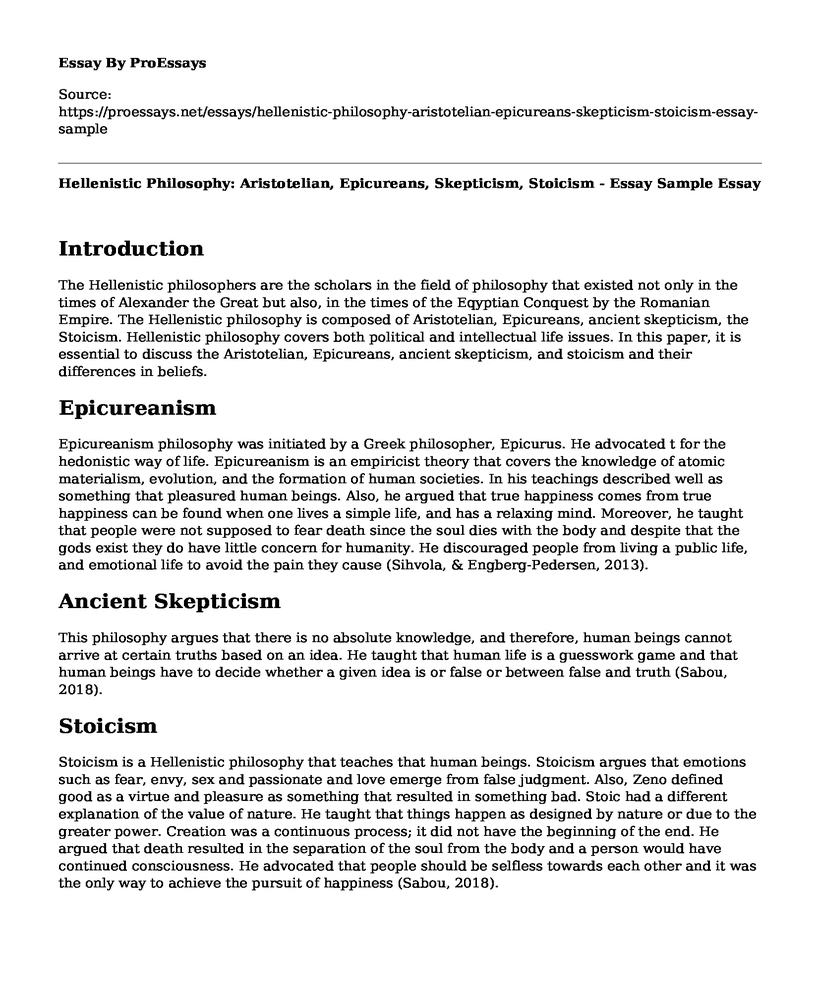Introduction
The Hellenistic philosophers are the scholars in the field of philosophy that existed not only in the times of Alexander the Great but also, in the times of the Eqyptian Conquest by the Romanian Empire. The Hellenistic philosophy is composed of Aristotelian, Epicureans, ancient skepticism, the Stoicism. Hellenistic philosophy covers both political and intellectual life issues. In this paper, it is essential to discuss the Aristotelian, Epicureans, ancient skepticism, and stoicism and their differences in beliefs.
Epicureanism
Epicureanism philosophy was initiated by a Greek philosopher, Epicurus. He advocated t for the hedonistic way of life. Epicureanism is an empiricist theory that covers the knowledge of atomic materialism, evolution, and the formation of human societies. In his teachings described well as something that pleasured human beings. Also, he argued that true happiness comes from true happiness can be found when one lives a simple life, and has a relaxing mind. Moreover, he taught that people were not supposed to fear death since the soul dies with the body and despite that the gods exist they do have little concern for humanity. He discouraged people from living a public life, and emotional life to avoid the pain they cause (Sihvola, & Engberg-Pedersen, 2013).
Ancient Skepticism
This philosophy argues that there is no absolute knowledge, and therefore, human beings cannot arrive at certain truths based on an idea. He taught that human life is a guesswork game and that human beings have to decide whether a given idea is or false or between false and truth (Sabou, 2018).
Stoicism
Stoicism is a Hellenistic philosophy that teaches that human beings. Stoicism argues that emotions such as fear, envy, sex and passionate and love emerge from false judgment. Also, Zeno defined good as a virtue and pleasure as something that resulted in something bad. Stoic had a different explanation of the value of nature. He taught that things happen as designed by nature or due to the greater power. Creation was a continuous process; it did not have the beginning of the end. He argued that death resulted in the separation of the soul from the body and a person would have continued consciousness. He advocated that people should be selfless towards each other and it was the only way to achieve the pursuit of happiness (Sabou, 2018).
Aristotelian Belief About Life
Aristotle taught that the soul was attached to an organic structure and that it existed in human beings, animals and plants. He defined the soul as a body that supports life. He argued that life is an ability to ensure self-sustenance, growth, and reproduction. He described the soul as an organic body with functioning organs. On the ethics approach of life, he argued that it is worth living and that it has its desires. Human beings found pleasure in food drinks, aesthetics, and intellectual knowledge. He taught that there was a group of people that found pleasure in the political sphere. He argued that life involved philosophical, political and voluptuary life (Aristotle, 2014).
Conclusion
To sum it up, Epicureanism, Aristotelian, Epicureans, ancient skepticism, and Stoicism philosophy have different perceptions on the issue of life and ethics. Epicurus and Aristotle had different perceptions of happiness. Epicurus taught that true happiness can be found when one lives a simple life, and has a relaxing mind. Aristotle argued that on food drinks, aesthetics and intellectual knowledge.
References
Aristotle. (2014). Aristotle: Nicomachean Ethics. Cambridge, England: Cambridge University Press.
Sabou, S. (2018). Happiness as Actuality in Nicomachean Ethics: An Overview. Eugene, OR: Wipf and Stock Publishers.
Sihvola, J., & Engberg-Pedersen, T. (2013). The Emotions in Hellenistic Philosophy. Berlin, Germany: Springer Science & Business Media.
Cite this page
Hellenistic Philosophy: Aristotelian, Epicureans, Skepticism, Stoicism - Essay Sample. (2023, Mar 20). Retrieved from https://proessays.net/essays/hellenistic-philosophy-aristotelian-epicureans-skepticism-stoicism-essay-sample
If you are the original author of this essay and no longer wish to have it published on the ProEssays website, please click below to request its removal:
- Essay Sample on Ethical Issues in the U.S Correctional Systems
- Essay on Ethical Issues and Challenges They Pose
- Essay Example on Political Fallacies
- In What Ways Is Identity Expressed Through Football Paper Example
- Ethics of Duty: Deontology & Immanuel Kant - Essay Sample
- Essay on COVID-19: Dysfunction and Denial - US on Course to See More Deaths
- Essay Example on Corporate Social Responsibility: Enhancing Brand Value & Improving Society







